The head of the World Health Organization (WHO) has called on Israel to lift restrictions on aid into Gaza, saying that the primary pipeline for emergency medical aid into the enclave from Egypt had been cut off.
Israel seized and closed the Rafah border crossing between Gaza and Egypt on 7 May, disrupting a vital route for people and aid into and out of enclave.
"At a time when the people of Gaza are facing starvation, we urge Israel to lift the blockade and let aid through," WHO Director-General Tedros Adhanom Ghebreyesus told a news conference in Geneva, describing the situation in the Palestinian enclave as "beyond catastrophic".
"Without more aid flowing into Gaza we cannot sustain our lifesaving support of hospitals and populations," he said.
Israel says UN agencies are to blame for not distributing aid more efficiently within the enclave, creating backlogs of supplies.
Mr Tedros said Israel's move had impacted six hospitals and nine primary health centres and caused 70 shelters to lose their medical facilities.
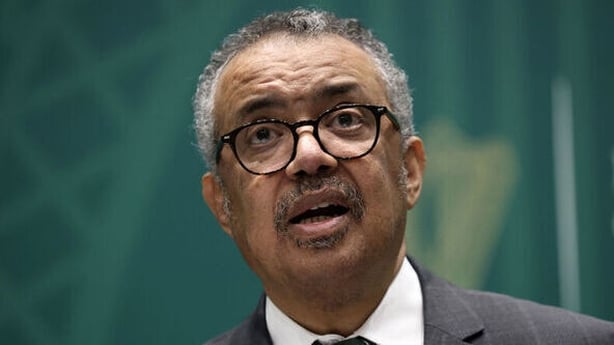
"Daily consultations have fallen by close to 40% and immunization by 50%," he said.
"Approximately 700 seriously ill patients who would have otherwise been evacuated for medical care elsewhere are stuck in a war zone."
The WHO said northern Gaza's last two functioning hospitals, Al-Awda and Kamal Adwan, were besieged by Israeli forces, with a total of over 200 patients trapped inside both.
Israel launched its ground assault on parts of Rafah early this month, defying international opposition including from top ally the United States, which feared for the more than one million civilians trapped there.
Israel has launched mass evacuations from Rafah where it has vowed to destroy Hamas and its tunnel system and rescue remaining hostages.
The UN says more than 800,000 people have fled Rafah.
Gaza's healthcare system has essentially collapsed since Israel began its military offensive there after the 7 October cross-border attack on Israel by Palestinian Hamas militants.
Mr Tedros said that Gaza's Al-Awda Hospital in northern Gaza remained under siege since Sunday, with 148 hospital staff and 22 patients and the people accompanying them trapped inside.
He said that fighting near Kamal Adwan Hospital, also in northern Gaza, had jeopardised its ability to care for patients.
"These are the only two functional hospitals remaining in northern Gaza," Mr Tedros said.
"Ensuring their ability to deliver health services is imperative."
Meanwhile, Qatar's foreign ministry spokesperson Majed Al-Ansari said the Gaza ceasefire and hostage release talks between Israel and Hamas remain "close to a stalemate".
The Gulf nation, along with the US and Egypt, has been engaged in weeks of behind-the-scenes talks to secure a truce in Gaza and the release of Israeli hostages in exchange for Palestinian prisoners held in Israeli jails.
It comes as Israeli forces battled Hamas fighters in Gaza after Prime Minister Benjamin Netanyahu dismissed a bid for an international arrest warrant against him on war crimes charges in the Palestinian territory.
US President Joe Biden backed Mr Netanyahu in condemning as "outrageous" the bid by the International Criminal Court's prosecutor who also sought warrants against leaders of Palestinian militant group Hamas.
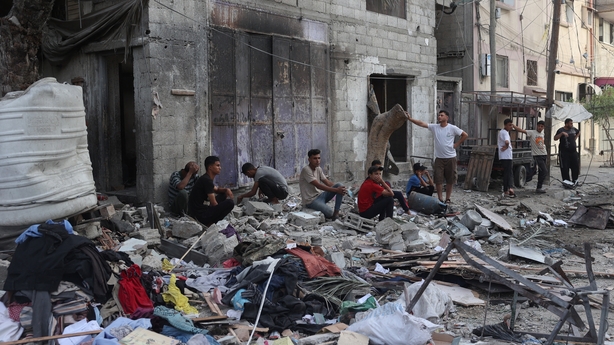
Israel's military reported ground combat and air strikes on 70 targets in Gaza in 24 hours, while its forces were also engaged in deadly clashes in the other major Palestinian territory, the occupied West Bank.
At least seven Palestinians were killed in the northern city of Jenin, the Ramallah-based health ministry said, as the army said it was "fighting armed men" in what it claimed was a pre-dawn "counterterrorism operation".
Palestinian official news agency Wafa reported that a hospital surgeon, a schoolteacher and a student were among those killed in Jenin, a stronghold of Palestinian militant groups.
In the south, airstrikes killed three children in a house in Khan Younis and at least five people including three children in a home in Rafah, health officials said.
East of Khan Younis, residents said they were fleeing Khuzaa town after Israeli troops began an incursion on the eastern edge of the territory, bulldozing across the border fence.
"Bombing everywhere, people are leaving in panic. It was a surprising incursion," one resident from Khuzaa told Reuters by phone as he and his family were leaving.
The Israeli military said over the past day it had "identified a terrorist shooting mortar shells at IDF (Israeli Defence Forces) troops," though no injuries were reported.
It said it had taken out the enemy with an airstrike and had located rockets and additional military equipment in the area.
Israel's war in Gaza started after Hamas' 7 October attack which sparked an Israeli retaliation that has brought a spiraling civilian death toll and left vast swathes of Gaza in rubble.
"We are running out of words to describe what is happening in Gaza," Edem Wosornu of the UN Office for the Coordination of Humanitarian Affairs told a Security Council meeting yesterday.
"We have described it as a catastrophe, a nightmare, as hell on earth. It is all of these, and worse," she said of conditions in the besieged territory of 2.4 million people.
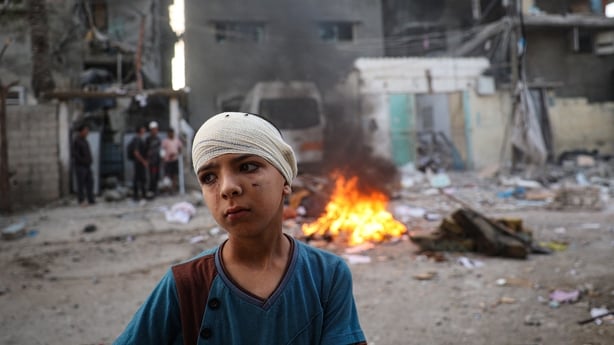
Ms Wosornu said that "1.1 million people face catastrophic levels of hunger and Gaza remains on the brink of famine" while three quarters of its people had been forcibly displaced, some up to five times.
The 7 October attack on Israel resulted in the deaths of more than 1,170 people, mostly civilians, according to an AFP tally based on Israeli official figures.
Hamas also took 252 hostages, 124 of whom remain in Gaza including 37 the army says are dead.
Israel's retaliatory offensive against Hamas has killed at least 35,562 people in Gaza, also mostly civilians, according to the territory's health ministry.
In Jabalia, a sprawling refugee camp built for displaced civilians 75 years ago, the Israeli army used bulldozers to clear shops and property near the local market, residents said, in a military operation that began almost two weeks ago.
Israel said it has returned to the camp, where it had claimed to have dismantled Hamas months ago, to prevent the militant group that controls Gaza from regrouping.
Palestinian medics said Israeli missiles struck the emergency department of Jabalia's Kamal Adwan Hospital, prompting panicked staff to rush patients on hospital beds and stretchers to the rubble-strewn street outside.
"The first missile when it hit, it hit the entrance of the emergency department. We tried to enter, and then a second missile hit, and the third hit the building nearby," said Hussam Abu Safia, the head of hospital.
"We cannot go back inside to them ... The emergency department provides a service for children, the elderly and people inside the departments of the hospital."
Israel backtracks on broadcast ban
Israel shut down the Associated Press's live video feed from war-torn Gaza and confiscated its equipment, before reversing the move hours later after the White House intervened.
The AP said Israel had accused the US news agency of violating its ban on Al Jazeera, which was ordered shut two weeks ago based on a new Israeli law governing foreign broadcasters.
Israel's Communications Minister Shlomo Karhi later announced he had issued an order to cancel the ban and return the equipment.
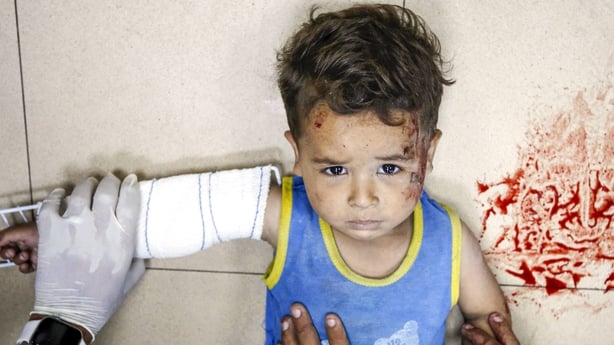
More than 569 tons of aid delivered to pier into Gaza
US Central Command (CENTCOM) has said more than 569 metric tons of humanitarian assistance has been delivered so far across a temporary floating pier to Gaza, but not all the aid has reached warehouses.
Aid deliveries began arriving at the US-built pier on Friday as Israel comes under growing global pressure to allow more supplies into the besieged coastal enclave.
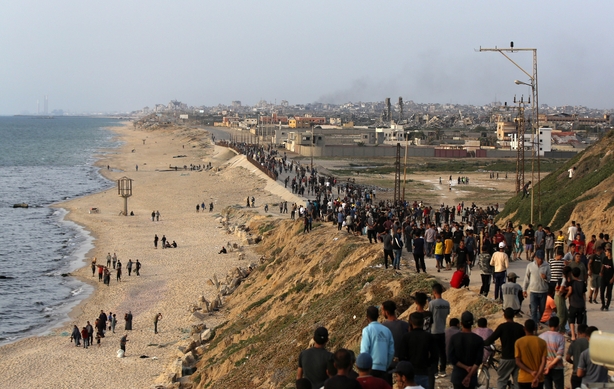
The UN said that ten truckloads of food aid – transported from the pier site by UN contractors - were received on Friday at a World Food Programme warehouse in Deir El Balah in Gaza.
But on Saturday, only five truckloads made it to the warehouse after 11 others were cleaned out by people during the journey through an area that a UN official, speaking on condition of anonymity, said has been hard to access with humanitarian aid.
The UN did not receive any aid from the pier on Sunday or Monday.
Read more: Israel, Hamas reject ICC bid to arrest leaders for war crimes
'Eerie quiet'
The UN agency for Palestinian refugees, UNRWA, said aid distribution had been suspended in Rafah "due to lack of supplies and insecurity".
The Director of Planning with United Nations Relief and Works Agency (UNRWA) said the streets of Rafah are quiet and deserted but there are constant sounds of drones in the air.
Sam Rose said that areas which were crowded with displaced people just ten days ago are now completely empty.
Speaking on RTE's Morning Ireland he said that on the ground there is "quite an eerie quiet, but in the air and from the sea, regular bombardments, constant buzzings of drones and real sense of military activity".
Mr Rose said people leaving Rafah end up on "barren strip of land right on the Mediterranean coast", which he said lacks any kind of facilities "in terms of toilets, water supply, infrastructure, health care, etc".
He said a very small amount of aid is getting through, but there has been looting, as desperate people swarm aid trucks.
He added that UNWRA is down to the last few days of supplies as is the World World Food Programme and others.
"Over 800,000 people in Rafah alone have been displaced over the past ten days. That's a third of the entire population of the Gaza Strip.
"The situation is very bad and it will get much, much worse if that operation does push on into western Rafah because it then affects the area where the international humanitarian community, including UNRWA, is operating from in the western regions of Rafah.
"So, we're fearing the worst unfortunately, yet again", Mr Rose said.

